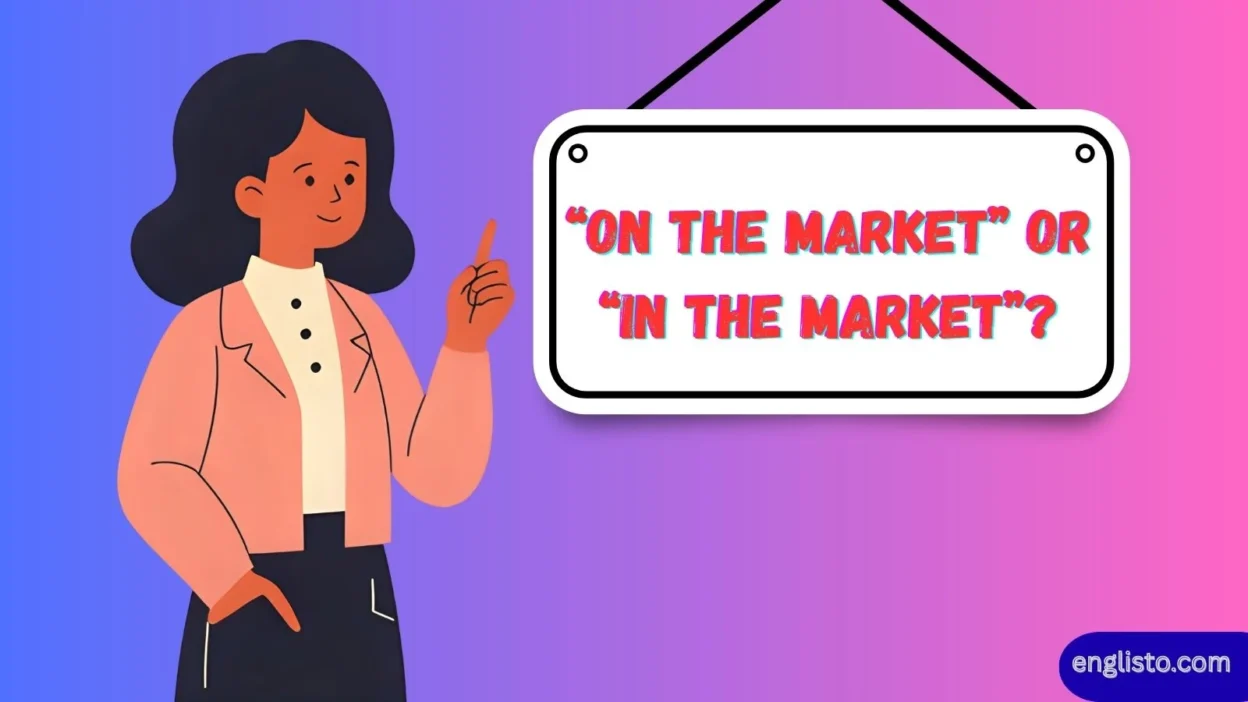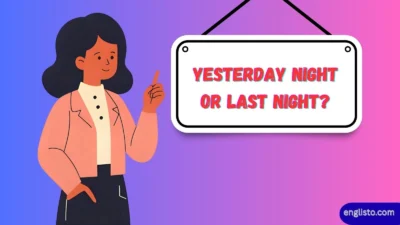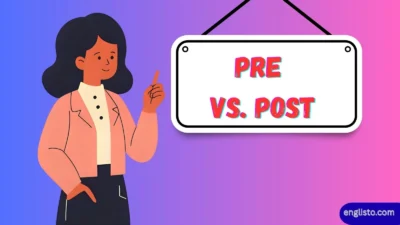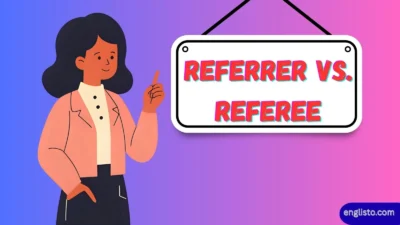Language learners, professionals, and even native speakers often pause when deciding between “On the Market” or “In the Market”? At first glance, they look similar, but in English, prepositions carry subtle meanings that can completely change the nuance of a phrase. Choosing the wrong one can make your sentence sound odd, unidiomatic, or even misleading.
This article explores the key differences, offers real-life examples, provides grammar explanations, and even compares British vs. American usage. Whether you’re writing about houses, products, stocks, or services, this guide breaks down the details so you can confidently use the right phrase every time.
Understanding the Core Difference
At its simplest:
- On the market = something is available for sale.
- In the market = someone is interested in buying.
This difference comes down to perspective:
- Sellers put things on the market.
- Buyers are in the market.
Think of it as two sides of the same transaction.
| Phrase | Meaning | Typical Use Cases | Example Sentence |
| On the market | Available, listed, offered for sale | Houses, cars, services, products | “This model phone is now on the market for $679.” |
| In the market | Looking to buy, seeking to purchase | Buyers, investors, clients, services | “We’re in the market for a new house near the city.” |
The Logic Behind Prepositions
English prepositions are often metaphorical. Here’s the intuition:
- On the market → “On” suggests something placed, listed, or displayed in a physical or abstract marketplace. Imagine products laid on a stall at a farmer’s market.
- In the market → “In” suggests being inside the space of buyers and sellers—participating, seeking, or involved.
This distinction isn’t arbitrary; it’s rooted in how markets were historically physical places. Even today, idiomatic English keeps this imagery alive.
Real-Life Examples in Different Contexts
Housing and Real Estate
- “The house has been on the market for 7 years without being sold.”
- “We’re finally in the market for a larger home after 12 years in our old apartment.”
Products and Services
- “This new vacuum cleaner model is now on the market.”
- “Clients in the market for wedding services often compare multiple companies.”
Financial Markets
- “New stocks will be on the market starting Monday.”
- “Investors are in the market for bonds with lower risk.”
Everyday Use
- “My stereo is on the market—I’m selling it cheap.”
- “I’m in the market for a pair of comfortable shoes.”
Historical and Regional Usage
Both expressions are well established in modern English, but their popularity has shifted over time.
- According to Google’s Ngram Viewer, “on the market” rose sharply in the 1880s, tracking with the rise of modern capitalism and property sales.
- “In the market” often appears in financial or economic texts, especially when discussing commodities, stocks, or investment trends.
Regional differences:
- British English (BrE): Both are common, but “on the market” is strongly favored in real estate listings.
- American English (AmE): Both are widely used, though “in the market” often emphasizes buyers’ intent.
Examples from Different Industries
| Industry | “On the Market” Example | “In the Market” Example |
| Real Estate | “85 homes were on the market in Santa Monica in April 2011.” | “We’re in the market for a beachfront property.” |
| Automotive | “The new electric car is finally on the market.” | “He’s in the market for a reliable used car.” |
| Technology | “A new phone model was released on the market.” | “Tech enthusiasts are in the market for affordable VR headsets.” |
| Services | “That catering company is on the market for weddings.” | “We’re in the market for catering services for our event.” |
| Finance | “Platinum options are on the market at the Chicago Mercantile Exchange.” | “Investors are in the market for Bitcoin alternatives.” |
Common Mistakes Learners Make
- Using them interchangeably
- Wrong: “I’m on the market for a new job.”
- Correct: “I’m in the market for a new job.”
- Wrong: “I’m on the market for a new job.”
- Forgetting the perspective
- Sellers → “on.”
- Buyers → “in.”
- Sellers → “on.”
- Mixing physical and abstract markets
- At a farmer’s market, you wouldn’t say the tomatoes are “in the market”; they are “on the market.”
- At a farmer’s market, you wouldn’t say the tomatoes are “in the market”; they are “on the market.”
Idiomatic and Metaphorical Usage
The phrases extend beyond literal buying and selling:
- “She put herself on the market after ending her long-term relationship.” (available for dating)
- “Graduates are in the market for their first jobs.” (seeking employment)
- “The company put its services on the market to attract new clients.”
This shows how English often blends literal commerce with metaphorical involvement.
Grammar Corner: Collocation and Word Choice
- “On the market” usually collocates with:
- houses, products, services, goods, stocks, appliances, belongings.
- houses, products, services, goods, stocks, appliances, belongings.
- “In the market” collocates with:
- buyers, investors, companies, clients, people, consumers.
- buyers, investors, companies, clients, people, consumers.
Visualizing Usage with a Graph
If you plotted usage with Google Ngram Viewer, you’d see:
- “On the market” dominating in discussions about houses, products, and services.
- “In the market” holding steady in texts about finance, commodities, and buyer intent.
Practical Tips for Writers and Speakers
- When describing availability → use on the market.
- When describing interest or intent to buy → use in the market.
- Always consider context: housing, finance, products, or services.
- Think about perspective: Who’s speaking—buyer or seller?
FAQs
What does “on the market” mean?
It means something is available, listed, or offered for sale, such as a house, car, or service.
What does “in the market” mean?
It means someone is interested in buying something, often used for houses, services, or investments.
Can I say “I’m on the market for a job”?
No. The correct phrase is “in the market for a job”, because you’re the buyer (job seeker).
Are both phrases used in British and American English?
Yes, but “on the market” is more common for properties and goods, while “in the market” is frequent in investment or buyer contexts.
Can “on the market” be used metaphorically?
Yes. For example, “He’s back on the market” often means he’s single and available for dating.
Conclusion
The choice between “on the market” and “in the market” isn’t random—it depends on perspective. Sellers put things on the market, and buyers are in the market. From real estate to financial sectors, from everyday shopping to idiomatic expressions, this distinction shapes clear, natural English.
So next time you write or speak, ask yourself:
- Am I describing something being offered? → Use on the market.
- Am I describing someone’s intent to buy? → Use in the market.
That small preposition makes a big difference—and using it correctly will make your English sound polished, professional, and precise.



